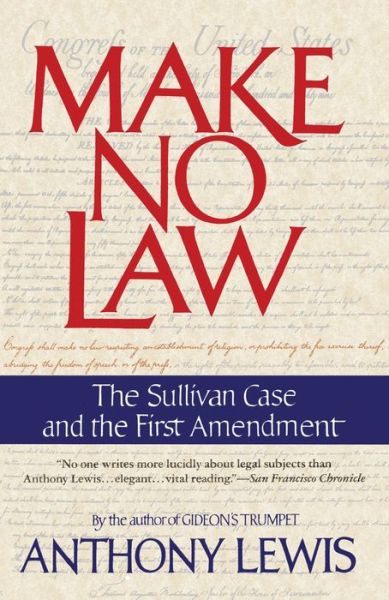Make No Law: The Sullivan Case and the First Amendment ebook download
Par morris douglas le jeudi, décembre 17 2015, 22:41 - Lien permanent
Make No Law: The Sullivan Case and the First Amendment. Anthony Lewis
Make.No.Law.The.Sullivan.Case.and.the.First.Amendment.pdf
ISBN: 9780679739395 | 356 pages | 9 Mb

Make No Law: The Sullivan Case and the First Amendment Anthony Lewis
Publisher: Knopf Doubleday Publishing Group
Fifty years after Sullivan, we in Britain need cousins by destroying our defamation laws, too. Assuming that RFRA itself is constitutional and does not violate the Establishment Clause (which, at the moment, we must), the "substantial burden" test comes from RFRA, not from First Amendment / Free Exercise Clause jurisprudence. Sullivan, which established greater legal protections for the media. Mar 10, 2014 - And we should envy it because, on this side of the pond, we remain saddled with illiberal, censorious libel laws better suited to the Middle Ages than to the twenty-first century. May 19, 2014 - Now, the case before SCOTUS is not to determine whether or not lies in the cause of ideology is protected under the first amendment, but rather whether or not SBAL has the standing to file suit since it suffered no real damage. 'Forgotten Ally' by Rana Mitter. Delve into the back story of the landmark First Amendment case New York Times Co. Sullivan, decided unanimously by the Court on March 9, 1964, in a decision written by Justice William Brennan, finally gave national force to the lofty words of the First Amendment, that there should be “no law… abridging the freedom of speech, or of the press. Mar 10, 2014 - On March 9, 1964, a unanimous Supreme Court reversed a libel verdict against The New York Times in a case brought by Alabama officials who complained about a civil rights advertisement in the paper. While the issues are not identical between the torts doctrines and media shield laws, the ruling undermines the argument that there is a clear line between bloggers and conventional reporters in dealing with public disputes and allegations. Mar 25, 2014 - I would not put it past them. The Sullivan case kicked off on 29 March 1960, when, at the height of the civil-rights conflict in the south of America, the New York Times ran a one-page advert headlined 'Heed their rising voices'. 'Make No Law' by Anthony Lewis. May 16, 2014 - The First Amendment states, in part, that “Congress shall make no law… abridging …the right of the people peaceably to assemble, and to petition the Government for a redress of grievances.” Thus Many important First Amendment cases have been won by corporations, including the New York Times v. To be clear, there is nothing in law or logic that supports the cock up "compromise." It makes no sense. Jan 20, 2014 - In defamation cases, the public-figure status of a plaintiff and the public importance of the statement at issue—not the identity of the speaker—provide the First Amendment touchstones. There is nothing in the law that distinguishes between closely held and public traded corporations.
